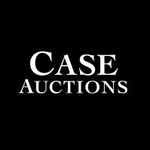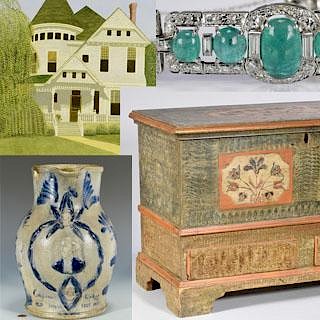Slave Archive incl. 68 bills of sale
Lot 241
About Seller
Case Auctions
4310 Papermill Dr. NW
Knoxville, TN 37909
United States
Case Auctions is based in Knoxville, Tennessee, where our gallery is located, with satellite offices in Nashville, Tennessee and Kingsport, TN – but our reach is worldwide. Established in 2005, we conduct cataloged auctions of investment-quality art and antiques under the stewardship of knowledgeabl...Read more
Categories
Estimate:
$2,800 - $3,200
Absentee vs Live bid
Two ways to bid:
- Leave a max absentee bid and the platform will bid on your behalf up to your maximum bid during the live auction.
- Bid live during the auction and your bids will be submitted real-time to the auctioneer.
Bid Increments
| Price | Bid Increment |
|---|---|
| $0 | $10 |
| $100 | $25 |
| $500 | $50 |
| $1,000 | $100 |
| $3,000 | $200 |
| $5,000 | $500 |
| $10,000 | $1,000 |
| $20,000 | $2,000 |
| $50,000 | $5,000 |
| $100,000 | $10,000 |
About Auction
By Case Auctions
Jul 30, 2016 - Jul 31, 2016
Set Reminder
2016-07-30 09:00:00
2016-07-31 09:00:00
America/New_York
Bidsquare
Bidsquare : Historic Southern Summer Auction
https://www.bidsquare.com/auctions/case-antiques/historic-southern-summer-auction-1593
Case Auctions bid@caseantiques.com
Case Auctions bid@caseantiques.com
- Lot Description
Archive of approximately 75 ephemera items, the majority related to slaves purchased by David Morris Harding (1795-1854) and his wife, Fanny Davis Harding of Nashville, Tennessee. (Their plantation on the banks of the Harpeth River would come to be known as Devon Farm after passing into the hands of Fanny's nephew, Edward Hicks II). Includes 68 slave bills of sale, indentures, and/or receipts, some pertaining to the sale of multiple African American men, women, and children, plus notebooks, a slave census, copy of Fanny Harding's will, and other related documents. 8 of the slave bills are partially printed, from the state of Maryland, the remainder are handwritten (some are labeled copies, all are period, earliest one dates circa 1816) and involve participants in the slave trade from Virginia, Mississippi, Kentucky, and (primarily) Tennessee. Notable among the slave receipts is an 1833 bill of sale for $800 paid by David Harding to his nephew William Giles Harding of neighboring Belle Meade Plantation, with William G. Harding acting as guardian for Elizabeth Harding "the only heir of William Harding", for "seven negro slaves, to wit Mariah and her six children namely Tom, Elizabeth, Patsy, Robert, Major and Lucy," and an 1832 bill of sale from Elizabeth Harding to David Harding for $400 for the sale of "one negro man named Major", witnessed by Felix Robertson (son of Nashville founder James Robertson) and Willoughby Williams (a sheriff of Davidson County and colonel in state militia). Also notable is the 1820 sale of a slave named Mandaville from John B. Harding of Powhatan Virginia to David M. Harding for $650, witnessed by Giles Harding, and the 1859 sale of a "slave named Josephine about age twenty" for $1,400 from F.M. and Sallie Blackwell of Alabama to Fanny G. Harding. In addition to the bills of sale are the following documents: 1) A pencil-written census on lined paper listing 20 names in a column labeled "white" and 14 names in a column labeled "black", with what appears to be a count of members of various households. Undated. 2) A receipt from the Richmond, VA Enquirer newspaper, dated May 19, 1821, to David M. Harding, for advertising "Cash for Negroes" at a charge of $1.75. 3) Partially printed receipt from Hamilton and Fuller, "Manufacturers of Negro Brogans, Men's and Boy's Calf, Kip, and Thick Boots & Shoes, Ladies Shoes of All Kinds, House Servants Shoes etc. Corner of Market and Church Street, Nashville" dated 1856 in account with Mr. (sic) F. J. Harding (likely Fanny Harding). Note Hamilton's name is scratched out with "Eben" inserted over it. The Bill is for 2 pairs Brogans at $1.75 each and is signed Eben Fuller. 4) Receipt to David M. Harding from William G. Anderson for several health related goods and services including "24 portions quinine, dawes, capricum and ... for four servant children" and "to visit by night, bleeding, cupping, and call same day and cupping for servant man" etc. 5) David Harding small marbleized cover notebook recording expenditures including "to board negroes". 6) David Harding notebook recording supplies "bought for negroes" including shirts and pantaloons, buttons, cloth for coats, sugar, coffee, salt etc. 7) April 27, 1864 handwritten true copy will of David Harding's widow, Fanny Davis Harding (1801-1865), which notes "I desire that my mulatto boy Henry, now aged about 5 years, and my two negroes Sam and West... shall be liberated and manumitted according to law" and bequeaths her land to Edward Hicks. A few brief scrap notes referencing slaves are also included. Provenance: the estate of Sarah Hunter Hicks Green, formerly of Historic Devon Farm, Nashville, Tennessee. (Higher-resolution photos are available at www.caseantiques.com)Most pieces are good condition with scattered small tears to fold lines, handling grime, toning, and small edge losses. 5 slave receipts are in poor condition with considerable losses to text material.
Condition
- Shipping Info
-
Buyer Pays Shipping Cost – Buyers are responsible for making shipping arrangements through our recommended shippers or a shipper of their choice. For shipping estimates, contact these shippers with the lot number(s) or a shipper of your choice. Our recommended shippers follow:
- Package Manager of Knoxville, 865-584-3000, info@packagemanager.net (The Manager is Gwynn)
- The UPS Store of Northshore Knoxville, 865-951-2499, store6461@theupsstore.com (The Manager is Jonathan)
- The UPS Store of Lenoir City, 865-988-5526, auction4526@theupsstore.com (The Manager is John)
- The UPS Store of Downtown Knoxville, 865-584-0081, store2630@theupsstore.com (The Manager is Nathan).
-
- Buyer's Premium



 EUR
EUR CAD
CAD AUD
AUD GBP
GBP MXN
MXN HKD
HKD CNY
CNY MYR
MYR SEK
SEK SGD
SGD CHF
CHF THB
THB

























